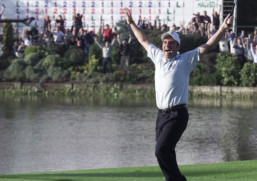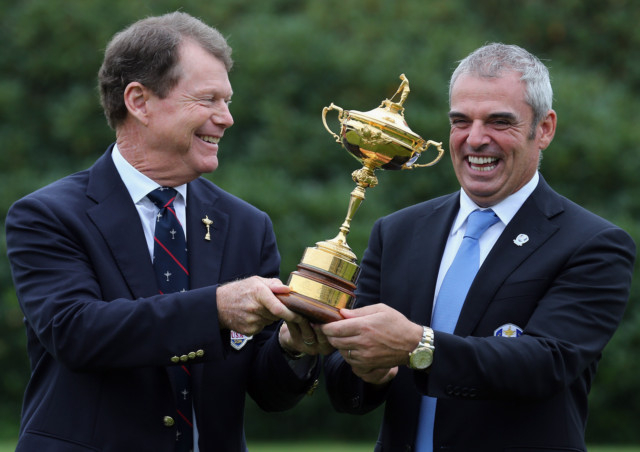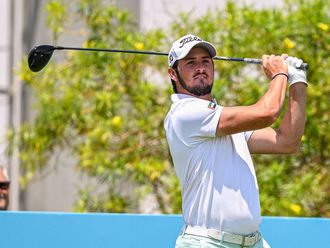
London: You wonder about captains and how much influence they have. Especially in golf’s pre-eminent team event, the Ryder Cup, where the captains don’t play. But five months from now the man sitting across from me in the bar of the Gleneagles Hotel in Scotland is going to be in the eye of a storm. By then you will know Paul McGinley better than you do now.
He is Europe’s captain for a series of matches that takes golf way beyond its boundaries. Still playing on the European Tour, McGinley, 47, has been a good player without reaching greatness. Except at the Ryder Cup. His brilliant up-and-down on the final hole of his match against Jim Furyk at The Belfry won the 2002 renewal. In five Ryder Cups, three as a player and two as vice-captain, he has yet to lose to the Americans.
When it came to deciding who should captain Europe for this year’s matches, McGinley was the man wanted by his peers, especially by those who performed the Miracle of Medinah two years ago.
To understand why captaincy matters at the Ryder Cup, consider why he has chosen Sam Torrance as a vice-captain. “Sam was captain in 2002, which was a tough one because the team was decided a year before but then 9/11 happened and the Ryder Cup was postponed. Some players in very good form in 2011 weren’t playing well in 2012. I was one of them. Fifth in the Order of Merit in 2011, 35th a year later. I was really worried about how I’d play in the Ryder Cup.
“A week before, with most of the European and US teams playing in a WCG event at Mount Juliet in Ireland, Sam took myself, Lee Westwood and Philip Price to The Belfry for a practice round. I’d travelled with Sam and his driver.
“On the way back he opened a bottle of pink champagne, produced two glasses, and said, ‘Okay Paul, this is how I see your involvement next week. You won’t play the first morning, instead you’ll go out in the afternoon foursomes with Padraig [Harrington] and you’ll play foursomes with Padraig again the next morning.’
“I was thrilled. I knew I would play three times, two foursomes and the singles.”
McGinley played well in that first foursomes match but he and Harrington lost a high-quality match 3&2 to Jim Furyk and Stewart Cink. Harrington felt he’d let his partner down and pulled out of the next morning’s foursomes.
McGinley ended up playing the afternoon fourballs match, alongside Darren Clarke against Scott Hoch and Davis Love. On the 18th tee, the Americans were one up. If they held onto it, their team would have a one-point lead going into the singles. McGinley hit a fine shot round the corner, longer than the Americans. Clarke drove into the rough, on the downslope of a bunker 225 yards from the pin. As McGinley waited for his partner to lay up in front of the lake, Torrance appeared.
“Sam tapped me on the backside, then got me into a headlock and said, ‘Paul, I want you to play first, before Darren, put them under pressure.’”
McGinley hit the sweetest four iron to 20ft. Par at worst. Hoch and Love hit their approaches tentatively, both balls well below the hole on a three-tiered green. They both three-putted. McGinley made par. Europe halved that match and went into the singles dead level.
Torrance was only getting into his stride. “When I got back to the team room, the music was on, the place was buzzing. Sam came up to me, ‘Paul, you showed a lot of balls out there. You will play No 12 tomorrow (Monday) because I know if we need a point in the last match, you’re the guy who will get it.’ I felt 10ft tall. I went to my room, showered, came back down and saw the pairings. I wasn’t at 12, but hidden at No 9.
“Completely deflated, I thought Sam was playing games with me. ‘Sam, can I have a word?’ He grabbed me by the ears, his moustache about three inches from my nose and looked into my eyes. ‘Paul, in the history of the Ryder Cup, the winning point has never come from the player at 12. It’s always come from eight to 10 and that’s why I’ve switched you to No 9.’ Now I feel 20ft tall. Then when I’m going across the bridge at 18, needing that up-and-down to win the Ryder Cup, Sam comes to me and says, ‘This is exactly why I put you at nine. Do it for me.’ When the putt dropped, I put my arms in the air and turned to where Sam and my teammates were. It was their success as much as mine.
“You look back on the video of Medinah and you will see Martin Kaymer hole the winning putt and immediately turn to where his teammates are standing. Compare that to footballers bobbing and weaving to get away from their teammates when they score. To get back to Sam, his man-management of the team, and of me personally, was outstanding. It’s why I want him involved this year.”
In that story of Torrance’s captaincy, there is a principle to which McGinley professes absolute allegiance. The evidence said No9 in the singles was most likely to deliver the winning point and Torrance acted on it.
There is a template, he says, handed from one European captain to the next, something that can be developed but should never be discarded. Europe have won seven of the past nine Ryder Cups, so a lot of people have been making good decisions.
“I think of the 1997 Ryder Cup at Valderrama as the beginning of the modern-day European team. From ‘97 to now, Lee Westwood has played in every Ryder Cup, Sergio since ‘99, though he was a vice-captain in 2010, and what’s going round in Lee’s and Sergio’s heads about how things will be for the team at Gleneagles is correct. It will be what they expect, but enhanced. I don’t have to be a maverick here.” Rory McIlroy, Henrik Stenson, Garcia, Victor Dubuisson and Jamie Donaldson are assured of their places in the team. They are likely to be joined by Ian Poulter, Luke Donald, Justin Rose and Thomas Bjorn. If they don’t qualify, Lee Westwood and Graeme McDowell would be expected to get two of the three wildcards.
It is a strong team but so, too, will the Americans be strong. In Tom Watson they have a captain with whom McGinley has long had a close bond. “I’ve had two sporting heroes in my life. Trevor Brooking, who played for my football team West Ham, and Tom Watson. As a kid at school, I wrote a quotation from Watson into my textbook. ‘What makes success? Desire, dedication, determination and a little bit of talent.’”
He has gotten to know Brooking, whom he invited to Augusta when he played in The Masters and who will be his guest at Gleneagles in September. His first meeting with Watson is burned into his consciousness.
“Second major I played in the US, the PGA at the Athletic Club in Atlanta, 2001. First morning I woke at 5am, rang my caddie, JP Fitzgerald, and we were walking to the first tee an hour later. That tee was behind a hedge, one player was already there, Tom with his caddie Bruce Edwards.
“As a student at the University of San Diego, I’d stalked Tom during his practice rounds when he played at Torrey Pines. This was like a love affair. He’d always intrigued me. The brisk walk, the ability under pressure, the sense of destiny. Now I had one of those, ‘Should I go or should I stay’ moments.
“I walked up to him, stretched out my hand, ‘Tom, I’m Paul McGinley from Ireland, would you mind if I joined you?’ He looked at me and the moment seemed to last for a long time. Then he said, ‘Irishmen are always welcome in my company’. We chatted the whole way round, became friends and have been ever since.
“For Tom to be US captain for this one . . . well, what a thrill to go up against your hero. If this was Hollywood and I was writing the script, Tom Watson would have been US captain.”
What kind of captain will he be? “He will be hard, incredibly competitive and will command a lot of respect from everyone involved. Tom Watson stands for everything that is good about golf. I would like to think I can rise to those same standards. I want Gleneagles to be rocking for the Ryder Cup, for our fans to make the atmosphere electric, but there is a line that must not be crossed. We have spoken to our stewards and they know where that line is.”
Would he encourage Europe’s fans to applaud a good shot by an American player? “Yes, but not with vigour.”









